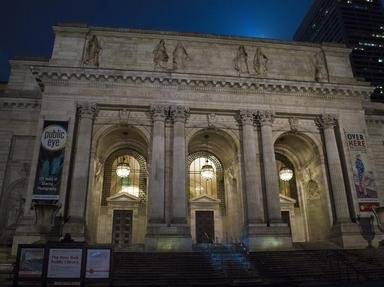Quiz Answer Key and Fun Facts
1. "Robert Cohn was once middleweight boxing champion of Princeton." This line is the opening sentence to what work from the 1920s about the lost generation?
2. "Guys like us, that work on ranches, are the loneliest guys in the world. They got no family. They don't belong no place. They come to a ranch an' work up a stake and then they go inta town and blow their stake, and the first thing you know they're poundin' their tail on some other ranch. They ain't got nothing to look ahead to." These words are from what novel from the 1930s?
3. "From that time on, the world was hers for the reading. She would never be lonely again, never miss the lack of intimate friends. Books became her friends and there was one for every mood." This is a passage from what book from the 1940s?
4. "Don't ever tell anybody anything. If you do, you start missing everybody." Identify the title of the coming-of-age story published in 1951 that contains this line.
5. "'I love you,' Rachael said. 'If I entered a room and found a sofa covered with your hide I'd score very high on the Voigt-Kampff test.'" What is the name of this sci-fi story from the 1960s?
6. "I was born upon the prairie, where the wind blew free and there was nothing to break the light of the sun. I was born where there are no enclosures and where everything drew a free breath." From what 1970 book does this passage originate?
7. "Freeing yourself was one thing, claiming ownership of that freed self was another." What is the name of the highly-acclaimed book published in the 1980s set in the American south where this quote can be found?
8. "The Santa Anas blew in hot from the desert, shriveling the last of the spring grass into whiskers of pale straw. Only the _______ thrived, their delicate poisonous blooms, their dagger green leaves." This is the first line from what 1999 book, set in southern California?
9. "The problem was money and the indignities of life without it. Every stroller, cell phone, Yankees cap, and SUV he saw was a torment. He wasn't covetous, he wasn't envious. But without money he was hardly a man." This passage is from what book published in 2001?
10. "'This feather may look worthless, but it comes from afar and carries with it all my good intentions.' And she waited, year after year, for the day she could tell her daughter this in perfect American English." This passage is from a critically-acclaimed novel written in the second half of the 20th century. What is the name of the book?
Source: Author
PootyPootwell
This quiz was reviewed by FunTrivia editor
looney_tunes before going online.
Any errors found in FunTrivia content are routinely corrected through our feedback system.
